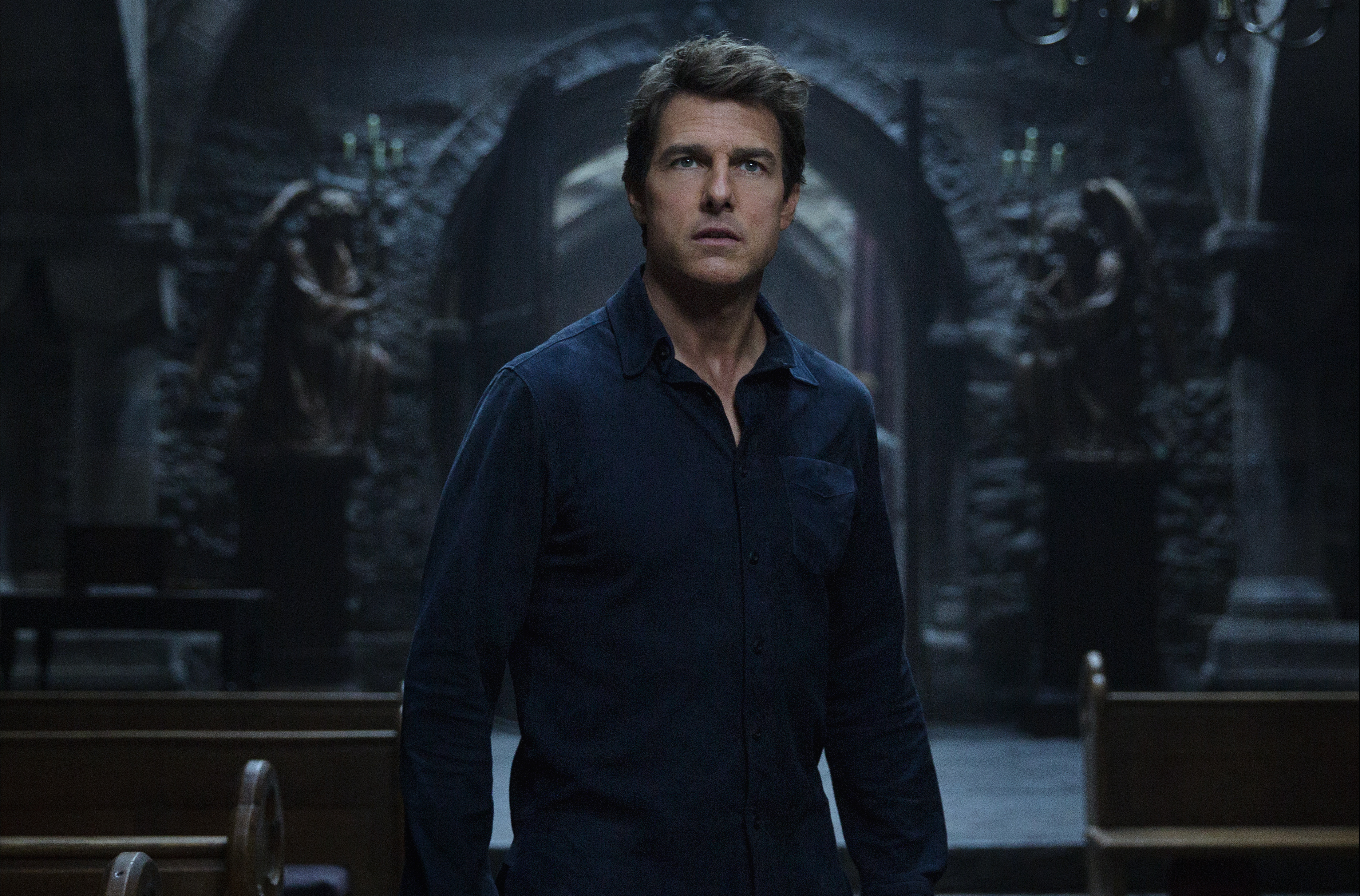How Tom Cruise's career got mummified
Why does the star of Jerry Maguire and Magnolia only appear in action movies now?


A free daily email with the biggest news stories of the day – and the best features from TheWeek.com
You are now subscribed
Your newsletter sign-up was successful
There's a sequence a little more than halfway through the new version of The Mummy where Tom Cruise, playing a military man with a major sideline in stolen antiquities, attempts to outrun a massive mummy-created sandstorm, and also jumps through a storm-tossed bus as it's hurled into his path. In other words: Tom Cruise-type stuff, familiar from six Mission: Impossible movies.
The weird thing, though, is that for most of his career, Tom Cruise was not an action star. Even Top Gun, which vaulted him from promising stardom to full-on superstardom in 1986, isn't really an action movie. It's a taming-of-the-hotshot drama, which was Cruise's ultra-specialized genre of choice early on. The Color of Money, Days of Thunder, and Cocktail all follow Cruise achieving excellence at a trade (often sort of a pointless one) while learning to be a slightly better man. It's a formula, but it doesn't have to produce Cocktail; to an extent, better movies like A Few Good Men and Edge of Tomorrow also follow this recipe.
As Cruise matured as an actor, he took on riskier projects and worked with an enviable line-up of filmmakers. Between 1996 and 2008, he made movies with Steven Spielberg (twice), Stanley Kubrick, Cameron Crowe (twice), Brian De Palma, Paul Thomas Anderson, Robert Redford, Bryan Singer, and Michael Mann. But since his perceived meltdown circa 2005 while promoting War of the Worlds, Cruise has regrouped and retreated into damage-control mode. He seems intensely concerned with proving that he hasn't lost his movie-star mojo.
The Week
Escape your echo chamber. Get the facts behind the news, plus analysis from multiple perspectives.

Sign up for The Week's Free Newsletters
From our morning news briefing to a weekly Good News Newsletter, get the best of The Week delivered directly to your inbox.
From our morning news briefing to a weekly Good News Newsletter, get the best of The Week delivered directly to your inbox.
Where his movies once toyed with the Cruise golden-boy image, his movies from this decade often convert it into a kind of man-of-action stoicism derived from his Mission: Impossible character, Ethan Hunt. For The Mummy, he's plugged into the kind of role that might typically go to a Chris (Hemsworth, Pratt, Pine; take your pick). Fifty-something Tom Cruise plays Nick Morton, a sort of a jerk version of Indiana Jones who plunders ancient treasure and sells it on the black market when he can.
This is how he gets mixed up with archeologist Jenny Halsey (Annabelle Wallis), accidentally helps to awaken the mummified Princess Ahmanet (Sofia Boutella), and becomes ensnared in her mummy curse. The movie takes advantage of Cruise's willingness to run and jump — and also to get knocked around. He takes some blows mentally, too, haunted by visions of his partner (Jake Johnson), and by Ahmanet herself.
Cruise projects are rarely terrible. Even his junkier movies have a decent quality filter, and he's never less than fully committed to his material. His performance in something like Jack Reacher doesn't dig as deep as his work in Magnolia or Vanilla Sky, but there's a different kind of pleasure in the unfussy wielding of his star power. In Edge of Tomorrow, his best recent film, he gives a movie-star performance that's downright dazzling. Cruise may be worthy of better roles, but few major stars have such a flair for bouncing off the ground. But in The Mummy, that ground feels further beneath him than usual.
Weirder still, the movie is often satisfying on its own silly terms. The Mummy is intended to kickstart the "Dark Universe," a series of films capitalizing on Universal Pictures' classic monsters (the Mummy, the Wolfman, Dracula, etc.), which sounded like a recipe for defanging those wonderful creatures. But this is more of a proper horror-adventure than the more directly Indiana Jones-y 1999 version of The Mummy. It's fun enough watching Cruise fight his way through the Lady Mummy's skeletal corpse minions, and grapple with Russell Crowe, playing a Dr. Jekyll reconceived as the head of a monster-tracking organization that's clearly supposed to be the Dark Universe's version of SHIELD from the Marvel movies or Monarch from the new Godzilla/Kong series.
A free daily email with the biggest news stories of the day – and the best features from TheWeek.com
But the Cruise shtick — indefatigable energy levels, cockiness, selfishness giving way to heroism — doesn't always gel with the horror bits. The Mummy is actually most compelling when it goes full-on B-movie monster mash, like when it focuses on its fabulously self-possessed villain. Boutella could have used more scenes to herself, or even opposite Cruise's character, who she vexes, entices, and nearly enslaves. But unlike Cruise, she gets the extravagant-B-movie tone.
The Mummy does wind up offering a novel twist on the Cruise self-improvement narrative — and his late-career monkishness. As with his action bona fides, Cruise's positioning as a romantic star was always a little overblown, a combination of dopey romances from his early films and the success of the lovely Jerry Maguire. In his late period movies, Cruise strenuously avoids romance; even if he starts out selfish or even flirtatious, he's far more likely to opt for honorable sacrifice or mentoring than a kiss. This has always been part of the Cruise persona; even Maguire has more than a hint of pragmatism animating its central relationship. But The Mummy takes it to an extreme, where Nick Morton begins the movie having already slept with Jenny Halsey, off-camera — and then they barely touch for the rest of the running time (except, of course, when he's saving her life).
One of the problems might be that Boutella is so much more interesting than Wallis — and that engaging with Ahmanet more directly, more often, might expose the film to a more complicated sexuality than it seems to be comfortable with. That may be, too, why this Mummy isn't all that scary. A force as exacting as Tom Cruise can certainly bob and weave his way through living corpses and look flummoxed in the moment. But he refuses to fully relinquish a sense of control, muting the movie's horrors. Cruise's steadiness powers a lot of his late-period action movies. In The Mummy it starts to feel like a constraint.
Jesse Hassenger's film and culture criticism has appeared in The Onion's A.V. Club, Brooklyn Magazine, and Men's Journal online, among others. He lives in Brooklyn, where he also writes fiction, edits textbooks, and helps run SportsAlcohol.com, a pop culture blog and podcast.
-
 The ‘ravenous’ demand for Cornish minerals
The ‘ravenous’ demand for Cornish mineralsUnder the Radar Growing need for critical minerals to power tech has intensified ‘appetite’ for lithium, which could be a ‘huge boon’ for local economy
-
 Why are election experts taking Trump’s midterm threats seriously?
Why are election experts taking Trump’s midterm threats seriously?IN THE SPOTLIGHT As the president muses about polling place deployments and a centralized electoral system aimed at one-party control, lawmakers are taking this administration at its word
-
 ‘Restaurateurs have become millionaires’
‘Restaurateurs have become millionaires’Instant Opinion Opinion, comment and editorials of the day
-
 Walter Isaacson's 'Elon Musk' can 'scarcely contain its subject'
Walter Isaacson's 'Elon Musk' can 'scarcely contain its subject'The latest biography on the elusive tech mogul is causing a stir among critics
-
 Welcome to the new TheWeek.com!
Welcome to the new TheWeek.com!The Explainer Please allow us to reintroduce ourselves
-
 The Oscars finale was a heartless disaster
The Oscars finale was a heartless disasterThe Explainer A calculated attempt at emotional manipulation goes very wrong
-
 Most awkward awards show ever?
Most awkward awards show ever?The Explainer The best, worst, and most shocking moments from a chaotic Golden Globes
-
 The possible silver lining to the Warner Bros. deal
The possible silver lining to the Warner Bros. dealThe Explainer Could what's terrible for theaters be good for creators?
-
 Jeffrey Wright is the new 'narrator voice'
Jeffrey Wright is the new 'narrator voice'The Explainer Move over, Sam Elliott and Morgan Freeman
-
 This week's literary events are the biggest award shows of 2020
This week's literary events are the biggest award shows of 2020feature So long, Oscar. Hello, Booker.
-
 What She Dies Tomorrow can teach us about our unshakable obsession with mortality
What She Dies Tomorrow can teach us about our unshakable obsession with mortalityThe Explainer This film isn't about the pandemic. But it can help viewers confront their fears about death.
